|
|
|
Sort Order |
|
|
|
Items / Page
|
|
|
|
|
|
|
| Srl | Item |
| 1 |
ID:
123537
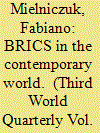

|
|
|
|
|
| Publication |
2013.
|
| Summary/Abstract |
This paper aims to address the reasons why the acronym brics is moving from being an easy marker to guide foreign investors interested in emerging markets to denoting an important political group of countries determined to promote major changes in international relations. Theoretically the paper draws on social constructivism to demonstrate that the changing identities of brics (Brazil, Russia, India, China and South Africa) can be treated as the main cause of the convergence of their interests in the international arena. Through a detailed analysis of these countries' statements at the opening sessions of the UN General Assembly from 1991 to 2011, their social claims about themselves are retraced and the way they have judged the international sphere in which they engage is captured, in order to demonstrate the changing character of their identities. These new identities, it is argued, created the opportunity for converging interests, which explains the emerging political structure of brics . The paper concludes that, after four major summits and a significant number of wide-ranging low-level meetings, brics might be considered one of the major long-lasting forces shaping the new architecture of international relations in the 21st century.
|
|
|
|
|
|
|
|
|
|
|
|
|
|
|
|
| 2 |
ID:
124581
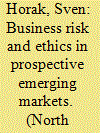

|
|
|
|
|
| Publication |
2013.
|
| Summary/Abstract |
urpose-This article discusses ethical issues of doing business with the Democratic People's Republic of Korea (North Korea) and associated risks in the area of sports sponsorship.
Design/methodology/approach-Ethical questions influence an international firm's engagement in North Korea in significant ways. Starting from a theoretical anchorage in business ethics, I apply descriptive case study methodology based on media analysis in order to understand ethical challenges of business management with North Korea by the example of firms from developed economies and emerging economies. This article is suitable to be used as a teaching case in international business and management classes (teaching notes are available on request from the author at sven.horak@gmx.de).
Findings-The study leads to three major propositions. International investors may benefit from first mover advantages in the area of sports sponsoring. On the contrary, breach of contract risks are high and a doubtful image of the sponsoring firm may be created in the eyes of the consumer while sponsoring a dictatorship. Moreover, the article finds indications that business transactions between two emerging markets appear to be smoother than between emerging markets and developed economies.
Originality/value-Only a few international firms are maintaining business relations with North Korea. If the new leadership opens up the country for international investors as proclaimed, international firms need to understand the prevailing business environment. In this context, the link between business ethics and associated risks has been rarely discussed since leadership change in 2011.
|
|
|
|
|
|
|
|
|
|
|
|
|
|
|
|
| 3 |
ID:
183774


|
|
|
|
|
| Summary/Abstract |
Governments interact strategically with sovereign bond market creditors: they make choices not only about how often and how much to borrow, but also under what terms. The denomination of debt, in domestic or foreign currency, is a critical part of these terms. The “original sin” logic has long predicted that creditors have little appetite for developing-country government debt issued in domestic currency. Our novel data, including bond issues by 131 countries in 240,000 primary market transactions between 1990 and 2016, suggest otherwise. Domestic-denominated bonds have come to dominate the market, although domestic-currency issuance often is accompanied by shorter bond maturities. We argue that ideologically rooted policy preferences play an important role in this unexpected trend in denomination. All else equal, right governments choose foreign denomination as a means of mitigating currency risk and thus minimizing borrowing costs. In contrast, left governments opt for the flexibility of domestic denomination, and they are better able to act on their preferences in the presence of risk-mitigating monetary institutions and macroeconomic stability. We find support for our argument that partisanship has a robust and enduring relationship with denomination outcomes, even in a marketplace in which domestic-denominated developing-country sovereign bonds have become the norm.
|
|
|
|
|
|
|
|
|
|
|
|
|
|
|
|
| 4 |
ID:
142006


|
|
|
|
|
| Summary/Abstract |
Academic literature and the media offer a variety of monikers for emerging states like Brazil, India and China, most prominently, ‘emerging powers’ and ‘emerging markets’. This article argues the terms used to describe these states create assumptions about their behaviour in global governance (GG). In order to accurately assess the impact of emerging states on international institutions, it is necessary to more systematically examine their current participation in GG. Does the use of power and economic interests in GG negotiations distinguish emerging states from traditional powers, as the ‘emerging’ part of these terms suggests? And can the content of GG negotiations predict the dominance of each factor, as implied by the ‘power/market’ part? This article tackles these questions by comparing the behaviour of one emerging state (India) and one traditional power (the United States) in negotiations at the World Trade Organisation and the United Nations Security Council. The results demonstrate that, while there is clearly something distinctive about at least India’s participation in GG, focussing on power or economic interests alone is insufficient to explain that distinctiveness or its implications for relations between rising and traditional powers in GG.
|
|
|
|
|
|
|
|
|
|
|
|
|
|
|
|
| 5 |
ID:
108961
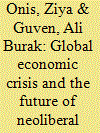

|
|
|
|
|
| Publication |
2011.
|
| Summary/Abstract |
This article outlines the main elements of rupture and continuity in the global political economy since the global economic crisis of 2008-2009. While the current calamity poses a more systemic challenge to neoliberal globalization than genetically similar turbulences in the semi-periphery during the 1990s, we find that evidence for its transformative significance remains mixed. Efforts to reform the distressed capitalist models in the North encounter severe resistance, and the broadened multilateralism of the Group of 20 is yet to provide effective global economic governance. Overall, neoliberal globalization looks set to survive, but in a more heterodox and multipolar fashion. Without tighter coordination between old and emerging powers, this new synthesis is unlikely to inspire lasting solutions to pressing global problems such as an unsustainable international financial architecture and the pending environmental catastrophe and may even fail to preserve some modest democratic and developmental gains of the recent past.
|
|
|
|
|
|
|
|
|
|
|
|
|
|
|
|
| 6 |
ID:
128321
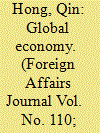

|
|
|
|
|
| Publication |
2013.
|
| Summary/Abstract |
The year 2013 continues to witness profound and complex changes in the international economic landscape. The underlying impact of the international financial crisis remains, and the recovery of the global economy is unstable, unsustainable and uneven. China has maintained steady economic growth through vigorous reform, and actively participated in global economic governance, making important contribution to global growth.
|
|
|
|
|
|
|
|
|
|
|
|
|
|
|
|
| 7 |
ID:
177672
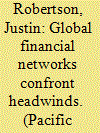

|
|
|
|
|
| Summary/Abstract |
China’s economic ties with the British Virgin Islands (BVI) exemplified global finance beyond national borders in the post-cold war period. This relationship now serves as an example of global finance’s more tenuous foundations as social and political forces coalesce against the offshore economy. The article establishes the defining conflict as the tension between national/global regulations and an Asian-headquartered network that coordinates offshore financial flows. The analysis outlines how the global network connecting Asia to the Caribbean has receded. Several factors are decisive. First, global and national forces are now aligned. Because global regulatory change is predicated on minimum standards only, domestic commitment to global regulatory norms is critical. Domestic commitment to the new international taxation regime is variable but a key development is that many large emerging markets have committed to the effort. China has forcefully imposed new restrictions on the offshore economy, including closing down routes for capital exit. One result is that the BVI–China relationship, after deep financial interconnections, is on a downward trajectory. The larger pattern than deserves further analysis is how action by China—along with India and Indonesia—suggests that substantive reform of the global offshore economy, led by Asian actors, is possible.
|
|
|
|
|
|
|
|
|
|
|
|
|
|
|
|
| 8 |
ID:
116044
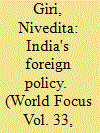

|
|
|
| 9 |
ID:
140461


|
|
|
|
|
| Summary/Abstract |
Highlighting legal–governmental techniques by which the public is conceptualised as the market and market activity as public agency, this article poses India as a key site for a globalised analysis of neo-liberal governance. It opens a genealogy for India's ‘emerging market’ governance that extends back to colonial modernisation, highlighting ties between a coercive state, its benevolent performance and the making of a market society. Such a long view challenges the free market vs. strong state opposition so central to contemporary neo-liberal thought. It also calls attention to the nexus between powers of emergency and emerging markets. Elaborating, the essay engages Foucault's analysis of neo-liberal political economy to read recent Indian jurisprudence on financial markets, the rule of law, and public interest.
|
|
|
|
|
|
|
|
|
|
|
|
|
|
|
|
| 10 |
ID:
139257
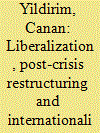

|
|
|
|
|
| Summary/Abstract |
This study provides a historical review of the transformation of the Turkish banking sector since the initiation of the financial liberalization program in 1980. It demonstrates the roles of macroeconomic, institutional and firm-level factors in the evolution of market and ownership structures as well as the performance of the sector. It focuses on the penetration of foreign banks in the Turkish market and the more recently observed entries of Turkish banks into neighboring countries. It contributes to the literature by illustrating how the domestic macroeconomic and institutional environment together with international banking circumstances affect the processes and outcomes of internationalization in emerging banking markets.
|
|
|
|
|
|
|
|
|
|
|
|
|
|
|
|
| 11 |
ID:
115618
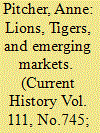

|
|
|
|
|
| Publication |
2012.
|
| Summary/Abstract |
Much of Africa's wealth is unevenly spread across the continent and tends to be concentrated in resource-rich countries with large populations.
|
|
|
|
|
|
|
|
|
|
|
|
|
|
|
|
| 12 |
ID:
169756
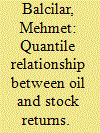

|
|
|
|
|
| Summary/Abstract |
This study extends the literature on the asymmetric effect of oil price fluctuations on emerging and frontier stock markets via a quantile-on-quantile approach that allows to capture normal and extreme states in each respective market. We find that oil risk exposures are heterogeneous across the emerging and frontier stock markets and indeed display quantile-specific characteristics. Observing uniform patterns of oil risk exposures within groups of countries that include both importers and exporters, we argue that oil price risk serves as a systematic risk proxy, capturing the market's concerns regarding global growth expectations, rather than a simple import/export commodity. Our findings suggest that signals from the oil market, either via measures of trading activity in oil futures or changes in basis values, could be utilized by policy makers to improve models of stock market volatility.
|
|
|
|
|
|
|
|
|
|
|
|
|
|
|
|
| 13 |
ID:
141062
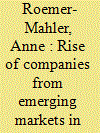

|
|
|
|
|
| Summary/Abstract |
The article analyses the involvement of pharmaceutical companies from emerging markets in global health governance. It finds that they play a central role as low-cost suppliers of medicines and vaccines and, increasingly, new technologies. In so doing, pharmaceutical companies from emerging markets have facilitated the implementation of a key goal of global health policy: widening access to pharmaceutical treatment and prevention. Yet, looking closer at the political economy underlying their involvement, the article exposes a tension between this policy goal and the political economy of pharmaceutical development and production. By declaring access to pharmaceuticals a goal of global health policy, governments and global health partnerships have made themselves dependent on pharmaceutical companies to supply them. Moreover, to provide pharmaceutical treatment and prevention at the global level, they depend on companies to supply medicines and vaccines at extremely low prices. Yet, the development and production of pharmaceuticals is organised around commercial incentives that are at odds with the prices required. The increasing involvement of low-cost suppliers from emerging markets mitigates this tension in the short run. In the long run, this tension endangers the sustainability of global access policies and may even undermine some of the successes already achieved.
|
|
|
|
|
|
|
|
|
|
|
|
|
|
|
|
| 14 |
ID:
126262


|
|
|
|
|
| Publication |
2013.
|
| Summary/Abstract |
The idea that we live in an increasingly interconnected and turbulent world is something of a cliché -- yet true and important nevertheless. Decisions made by the U.S. Federal Reserve affect the purchasing power of villagers in southern Thailand; consumer demand in Europe and North America affects the output of factory workers in eastern China, which affects the jobs of oil workers in Brazil, Russia, and elsewhere. Elite investors now routinely send their capital abroad in a ceaseless quest for new opportunities and high returns; whether they realize it or not, hundreds of millions of less highflying people do the same indirectly, through their mutual or pension funds. So global economic forecasting -- trying to look past current events to glimpse what's coming over the horizon -- has become an exercise of general, not specialized, concern.
|
|
|
|
|
|
|
|
|
|
|
|
|
|
|
|
| 15 |
ID:
159397
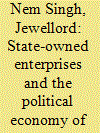

|
|
|
|
|
| Summary/Abstract |
The literature on developmental states has built theories of growth-enhancing strategies through a mutually constitutive state–business relationship and institutionalised expertise through a professional bureaucracy. Whilst most evidence bears on the East Asian context, recent empirical work has focussed on state agency and new industrial policies in response to global market integration. Our paper contributes to this debate by exploring multiple patterns of state enterprise reforms that have enabled governments to generate competitive domestic firms. These reforms, then, lead to new theoretical insights as regards the diverse institutional arrangements co-constituting state–state relationships across countries and sectors. Overall, the paper views state-owned enterprises (SOEs) as complex organisations that bear new developmental capacities rather than vessels of rent-seeking interests.
|
|
|
|
|
|
|
|
|
|
|
|
|
|
|
|
| 16 |
ID:
189695


|
|
|
|
|
| Summary/Abstract |
Following the 2008 global financial crisis, years of low interest rates provided a rare opportunity for many developing nations to borrow in international markets—whether issuing bonds in their own currencies, securing loans from private-sector banks and commodity traders, or borrowing from China, which emerged as a dominant official creditor. Developing countries’ overall external debt rose to a record level during this period. As central banks raise interest rates sharply to counter a global rise in inflation, many of these countries are at risk of default. The mix of public and private creditors and the opacity of many loan terms make it difficult to coordinate restructuring. The key factor may be domestic politics.
|
|
|
|
|
|
|
|
|
|
|
|
|
|
|
|
|
|
|
|
|